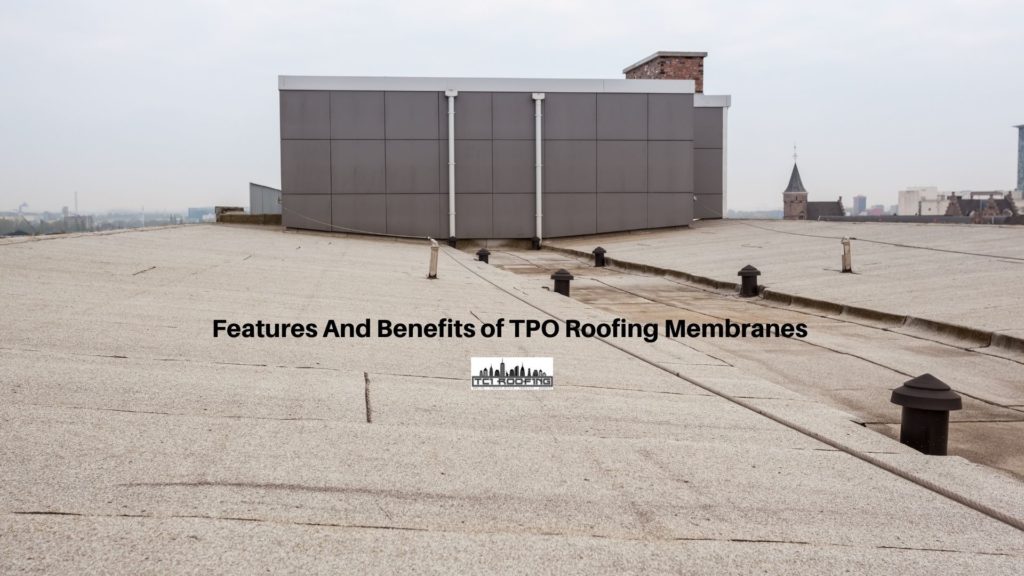TPO roofing is one type of roofing material most commonly used in a commercial setting. The membrane is designed to protect the roofing system while providing superior insulation properties, water resistance, and durability. It has been extensively used within the single ply roofing industry and can be found on both residential and commercial buildings. The TPO (Thermoplastic Polyolefin) roofing membranes are used in a variety of applications. They can be made from metal or plastic and provide protection against weather, wind, sun damage, and fire.
Types of TPO Roofing
TPO roofing membranes are available in different types:
TPO Laminate Membrane (Laminated TPE)
Laminated TPO is a single-layer roofing membrane that is composed of a TPO film and an acrylic scrim. It provides superior water resistance while maintaining flexibility for installation. They are commonly used in both residential and commercial settings.
Types of Laminates
Aluminized Polyester Film (APF)- high performance, barrier protection for metal roofs and below roof surfaces. It is used as a vapor retarder and is fused to the underside of metal roofing.
Polyester Film (PET)- It is a highly flexible membrane that can be used in a variety of applications, including water-resistant layers, vapor barriers for below deck surfaces or under tile roofs, external insulation cladding systems, and noise barrier panels for highways and air terminals.
Laminated Metal Roofing (Metal Laminate)
TPO laminate membranes are made from metal as well, but they have more than one layer of protection on the outside surface to prevent corrosion and rust. The metal is usually steel or copper, and it provides excellent durability. It is commonly used in industrial settings and is a popular choice for commercial construction.
TPO Membrane (Unlaminated TPE)
Unlike laminate membranes, the unlaminated TPO membrane is composed of a single layer of polyethylene. This type can be used as both an underlayment or a roofing material and provides superior durability in high-traffic areas. It also offers excellent insulation and water resistance.
TPO Membrane (Uni-Ply TPO)
A Uni-Ply roofing membrane is composed of a single layer of high-density polyethylene film that provides protection from moisture, wind, sun damage, and fire. It can be used on both new constructions or for repairs to existing roofing.
TPO Membrane Features And Benefits
One of the biggest benefits of TPO membranes is their superior insulating properties, which can keep buildings and homes cooler. It also provides excellent protection against water damage, extreme temperatures, wind erosion, and sun fading. The membrane’s flexibility makes it a popular choice for industrial construction as well because it can accommodate curved surfaces and provide protection from changing temperatures. Here are other few benefits that come with using TPO roofing membranes:
1) It has excellent weather resistance, good flexibility for installation, quick water-curing time, better UV protection than other materials such as PVC roofs, and high-temperature tolerance.
2) It is considered a high-performance roofing material because it provides protection against wind, sun damage, fire, or weather. TPO membranes are also very durable in comparison to other materials like metal roofs which can be more prone to corrosion and rust over time
3) They do not require any additional support or framing because they are self-supporting by design. This makes it easier to install, saving money on labor costs.
4) Low maintenance costs – TPO membranes are highly resistant to UV rays from the sun, which will cause damage over time.
5) Durability – The material is strong enough that it can withstand winds of up to 120 mph per hour with very minimal tearing or puncture points.
6) Water-resistant protection against weather, wind, sun damage & fire.
7) Provides superior insulation properties, which helps save up to 25% in energy usage by limiting air infiltration into the roof system.
8) It has the ability to weld seams together.
9) High UV protection guarantees that your roof will not fade when placed in direct sunlight for extended periods of time
10) Fade-resistant means less costly and time-consuming routine maintenance and replacement.
11) It is considered to be a “green” roofing material because it contains recycled content of up to 65% and is made from a renewable resource.
12) It has been rated by the Underwriters Laboratory to be an “A” fire-resistant roofing membrane that can withstand temperatures up to 900 degrees Fahrenheit without any of the material melting or burning.
13) The membranes are also resistant against hydrostatic pressure and do not lose integrity in the event of a storm.
14) A TPO roofing membrane is very versatile because it can be used in different types of commercial applications, from industrial to residential settings and more.
15) The membranes are flexible enough to cover any type of surface without damage or tearing, which makes them easy to install and maintain.
16) The membranes are made from a synthetic rubber material that has been tested for durability and strength, making them one of the most durable roofing products on the market today.
17) Features an acrylic scrim that provides excellent protection against UV rays, heat, and cold.
In Conclusion
TPO roofing membranes are an excellent choice for commercial building owners because they offer many benefits and features that make them stand out from the rest of the materials available. They are easy to install, provide excellent protection against weather, sun damage, wind, fire, or other types of natural disasters. Hence, it is essential to consider this type of roofing membrane if you are in the market for a new one.
If you are considering getting a TPO roof, contact TCI roofing services NYC. With generations of experience, you can rest assured that we will get the job done right the first time, every time for your roofing needs.

